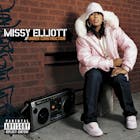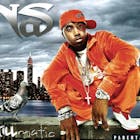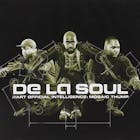
Classic Albums: 'The Eminem Show' by Eminem
Classic Albums: 'The Eminem Show' by Eminem
Published Thu, May 26, 2022 at 12:00 PM EDT
In 2002, Eminem was one of the most omnipresent artists in music. For three years, he'd been at the center of rap's orbit.
His major label debut, 1999s The Slim Shady LP, had made him a household name, drawing critical acclaim and public scorn in almost equal measure. Scene-stealing guest spots throughout Dr. Dre's smash 2001 only fueled Em's rise to the top of Hip-Hop and popular music; with 2000s The Marshall Mathers LP cementing him as one of the biggest artists in the world. He was part of 2000s uber-successful Up In Smoke Tour alongside Dr. Dre, Snoop Dogg and Ice Cube; the following year, he launched his own label, Shady Records, and his hometown group D12 dropped their platinum-selling debut, Devil's Night. And he contributed a famously stellar guest appearance on "Renegade" from Jay-Z's 2001 classic The Blueprint. But even as his star shone brighter than ever, Eminem was a lightning rod for controversy.
He'd performed his hit "Stan" at the 2001 Grammy Awards alongside pop/rock icon Elton John as an "answer" to critics who'd blasted the rapper for homophobic lyrics on The Slim Shady LP and The Marshall Mathers LP. Despite a protest organized by GLAAD that was held at Staple Center prior to the big show, John defended performing with Em.
"People that were interviewing me over in the U.K. started talking about it to me and bringing it up," Em said in a 2001 MTV interview. "And it's like, 'What do you think about Elton John saying this and that about you?' And I was like, 'He did? OK.' Then I read the articles where he actually had my back on stuff, and it was cool. I was like, 'OK, well, I really respect Elton.'"
But it wasn't just the critics who were hounding Eminem. His personal life was spinning dangerously out of control.
In 1999, he'd married his high school sweetheart and longtime muse, Kim Scott, with whom he'd shared 5 year old daughter, Hailie Jade. A few months into their marriage, Eminem was involved in a domestic incident after seeing Kim with another man at a Detroit bar and pistol-whipping him in the parking lot. That led to a felony assault charge; which came on the heels of another violent altercation with members of Insane Clown Posse. His mother Debbie Mathers sued him in 1999 for disparaging lyrics about her drug abuse and his childhood; then released a diss song called "Dear Marshall" as an answer record in 2000.
Oh and he also wound up beefing with Moby, at one point.
DROP YOUR EMAIL
TO STAY IN THE KNOW
His life had become one long, bizarre episode of The Jerry Springer Show; but his music was still red-hot. He'd begun work on the album in 2001, and poured his entire life into the music. He divorced Kim and refocused on raising his daughter, while also working out and eating healthy. He had a lot to unpack.
The Eminem Show mines the kind of superstar angst that 2Pac, Biggie and DMX made popular before him and Kanye West would take to irritating heights in his wake; but Em's troubles are strong fodder for his creative inspiration throughout the album. He's alternately wounded and defensive but also defiant and obnoxiously Slim Shady; as evidenced on the lead single "Without Me" on which he cheerily gloats that pop culture feels empty whenever he isn't around to get in trouble. On "White America" he stares down the most obvious criticism hurled in the wake of his gargantuan success: that he wouldn't be shit if he wasn't white.
But the song that serves as the album's spiritual core is "Cleanin' Out My Closet," on which Em airs out his tortured relationship with his mother in painfully warts-in-all fashion.
“'Sing for the Moment' was the first song I wrote for the album," he told Rolling Stone at the time. "'Cleanin' Out My Closet' was the second. I had the line in 'Cleanin' Out My Closet' — 'I’d like to welcome y’all out to The Eminem Show' — and it was just a line, but I sat back and I was like, 'My life is really like a fucking show.' I have songs on the album that I wrote when I was in that shit last year, with a possible jail sentence hangin’ over my head and all the emotions going through the divorce. I went through a lot of shit last year that I resolved at the same time, all in the same year. And, yeah, that’s when half of the album was wrote."
Em's anger at his mom and at Kim and at his critics are mainstays of his early 2000s albums, and though it doesn't dwell in the darkness quite as much as The Marshall Mathers LP before it, The Eminem Show makes it clear that Marshall is still working through that anger. His wit, more acidic and pointed as ever, is usually his weapon of choice on ...Show; and his love of his daughter is just as emphasized a theme throughout the album. The Eminem Show is also relatively scant on guest stars; it's clear that this is Em's first real reaction to becoming a megastar and he wanted to use this project to center that experience.
Sure, Marshall Mathers was plenty famous after The Slim Shady LP put him all over MTV; but by the time he got to work on The Eminem Show, his celebrity was in another stratosphere. And his bitterness about what fame brought with it; how it changed his family dynamic and proved to be a toxic component in his marriage to Kim, it's all coursing through The Eminem Show's tracks. And nowhere is it more evident than on the single "Superman," where Em goes full "we don't love these hoes" over a strip club-friendly beat. The song and video aren't all that out of the ordinary for early '00s rap, in terms of woman-bashing venom; but coming on the heels of his divorce from Kim, it's not hard to hear the resentment Em is nursing towards his ex.
As the album release loomed, Em was also finishing up his first starring role in a motion picture. He'd been tapped to star in the semi-autobiographical 8 Mile, as a down-on-his-luck rapper from Detroit named Rabbit. Director Curtis Hanson had been shooting around Highland Park, Michigan since late 2001; producer Brian Grazer developed the film with Em in mind, and Mekhi Phifer, Brittany Murphy and Kim Basinger were among the cast. This was a serious movie project, and Em was the star. The pressure was on, and it was stacked on top of a myriad of personal and legal issues swirling around the rapper.
But when The Eminem Show was released in May 2002, it was clear that Em's uber-hot streak was showing no signs of cooling. The rollercoaster ride he'd been on since 1999 was still cresting, as his fourth album debuted at No. 1 and stayed there for six weeks, en route to becoming the best-selling album in the U.S. for 2002.
There's certainly something to be said for witnessing an artist at the top of their game. And Eminem from 1999 through 2004 was indeed that, a potent mix of star power, undeniable talent and perfect timing. His fourth album isn't just him resting on his laurels or basking in his own celebrity, it's uncomfortable and real, it's brilliant and offensive, it's quintessentially Eminem at a time when his audience was still figuring out what that means. A song like the bombastic "Til I Collapse" remains a favorite because he sounds so supremely in his bag as a lyricist and producer, he sounds so unapologetically confident in his own abilities. It's the kind of song that even his biggest haters can't deny.
That he delivered an album this assured with all that was swirling around him is a testament to his talents. Eminem was at the peak of his powers here, and he delivered an album that cemented his legacy as one of the greatest artists of his generation. An underdog that made good, he was now a superstar making his own way.
"Failure has always been the biggest motivation to me — the fear of losing and somebody getting the last laugh on me," Em said in 2002. "I’ve felt since my first day of rapping that my time is ticking. That’s how I’ve based my whole career — that this may never happen again. The truth is, this could end tomorrow. I’ve seen so many albums get slept on. Pharcyde’s first album should have been huge, that shit should have sold 6, 7, 8 million. Fans are so fickle and so quick to turn on you, too. Suddenly, you’re not cool no more, you’re like the Kris Kross jeans or something, even if at first you’re the greatest thing since sliced cunt."






